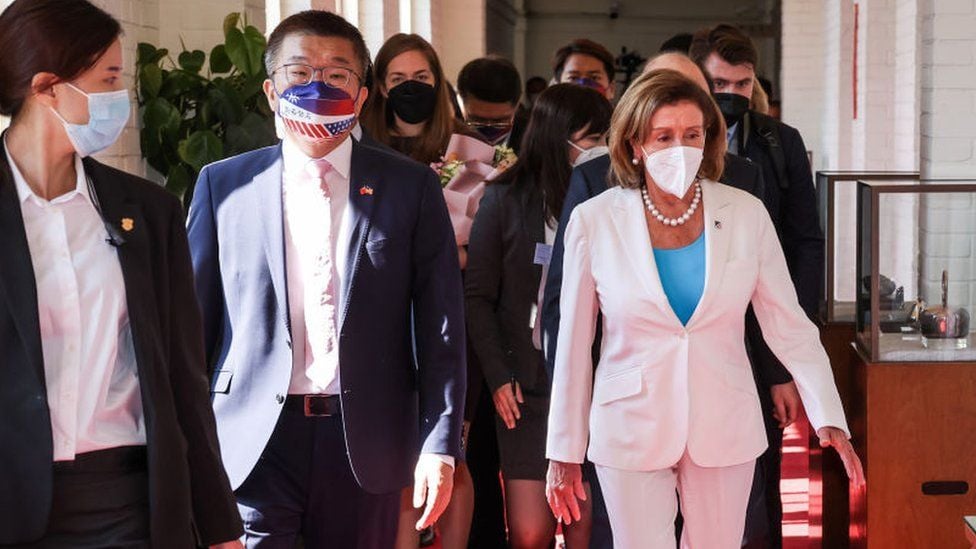Taiwan: Nancy Pelosi trip labelled as 'extremely dangerous' by Beijing
China has branded a landmark visit to Taiwan by US Speaker Nancy Pelosi as "extremely dangerous".

Aug 3: It accused Ms Pelosi, the most senior US politician in 25 years to visit the island China claims as its own, of "playing with fire".
"Those who play with fire will perish by it," Beijing warned in a statement.
US national security spokesperson John Kirby said there was "no reason for this visit to become a spurring event for a crisis or conflict".
Speaking after Ms Pelosi's arrival, he reiterated to reporters that the trip was consistent with the US's long-standing policy towards China and did not violate the country's sovereignty.
Early on Wednesday, Ms Pelosi made her way to parliament, where she spoke to Taiwan's deputy speaker and then addressed the media.
She said she came "in peace to the region" and that she wanted to increase parliamentary exchanges between Washington and Taipei, and commended Taiwan for being "one of the freest societies in the world". She then headed in to a closed-door session.
She also said that a US bill on computer chips would be a good opportunity to increase cooperation given that Taiwanese chip manufacturer TSMC produces more than half of the world's semiconductors.
Ms Pelosi is expected to meet Taiwan's President Tsai Ing-wen later on Wednesday, as well as a group of human rights activists.
Her visit comes despite repeated warnings from China, which sees Taiwan as a breakaway province which will one day unite with it. Beijing has not ruled out the possible use of force to achieve this.
Even before Ms Pelosi's visit, tensions between the US and China have been rising for years - with Taiwan being one of the major flash points.
As her plane touched down, Chinese state media reported that its military jets were crossing the Taiwan strait. Taiwan denied those reports at the time, but later said that more than 20 Chinese military planes had entered its air defence zone on Tuesday.
Within an hour of Ms Pelosi's arrival, China announced that the People's Liberation Army will conduct a series of live-fire military drills in the air and at sea around Taiwan later this week - warning ships and aircraft not to enter the affected areas.
This follows days of escalating tensions in which Chinese warplanes had already ventured out as far as the median line, the unofficial divide separating China and Taiwan in the waters between them.
'Not going to be intimidated'
While Ms Pelosi's visit had been the subject of huge international speculation for days, it had been shrouded in secrecy until the last minute.
When she set off on a tour of Asia on Sunday, there was no mention of Taiwan on her official itinerary, which included Singapore, Malaysia, South Korea and Japan.
The White House has been open in its opposition to any such trip, and President Joe Biden said the military assessed it as "not a good idea".
But after Ms Pelosi landed, the White House's Mr Kirby told CNN this visit was similar to previous trips by other officials, adding that the "United States is not going to be intimidated by threats".
On Wednesday, Chinese Foreign Minister Wang Yi released a statement reiterating China's opposition to Ms Pelosi's visit.
Mr Wang called it an "open political provocation", adding that it "seriously violates the one-China principle and harms China's sovereignty".
"The US must stop obstructing China's great reunification. Taiwan is an inalienable part of China".
China exerts international pressure on other nations to accept its "One China" principle - that there is only one Chinese nation, based in Beijing. Only 15 nations in the world have formal diplomatic relations with Taiwan.
The US however, abides by the "One China" policy - which sees it recognising and having formal ties with China rather than Taiwan - but allows it to maintain a "robust unofficial" relationship with the island. That includes selling weapons for Taiwan to defend itself.









Leave Comment